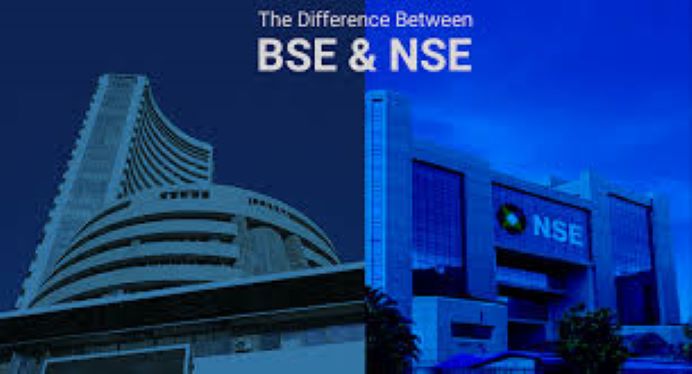National Stock Exchange (NSE) and Bombay Stock Exchange(BSE) are two prominent stock exchanges in India and one can buy,sell and trade listed securities on both the stock exchanges. However, people often remain confused as to why there are two different stock exchanges for the sale and purchase of listed securities and stocks and what is the difference between NSE and BSE ? Some of the common questions asked by the people in this regard are listed below:
- Which is better NSE or BSE?
- Can I buy in BSE and sell in NSE?
- Why there is price difference between NSE and BSE?
- Why are companies listed on both BSE and NSE?
In this article we will explain the difference between NSE and BSE and will attempt to answer all the questions frequently asked by the investors in this regard.
The National Stock Exchange (NSE) and the Bombay Stock Exchange (BSE) are the two primary stock exchanges in India. While both serve as platforms for trading securities, they differ in various aspects, including their history, structure, trading mechanisms, and market dominance.
- History and Establishment: The Bombay Stock Exchange (BSE) is the oldest stock exchange in Asia, established in 1875. It has a rich legacy and played a significant role in the development of the Indian capital market. On the other hand, the National Stock Exchange (NSE) was established in 1992 to bring transparency, efficiency, and technology-driven trading to the Indian stock market. It introduced electronic trading, which revolutionized the way stock trading was conducted in India.
- Ownership and Governance: The BSE is a corporatized and demutualized exchange, meaning it is owned by shareholders, and its governance is separate from its trading members. In contrast, the NSE is also a demutualized exchange, but it is owned by various financial institutions, banks, insurance companies, and other market intermediaries. The NSE operates on a shared ownership model, ensuring a broad base of participation.
- Market Dominance: The BSE was traditionally the dominant stock exchange in India until the NSE was established. Over the years, the NSE has gained prominence and currently holds a significant share of the trading volume in the Indian stock market. However, both exchanges continue to operate and compete with each other, providing investors with multiple options for trading.
- Trading Mechanisms: The BSE follows an open outcry system, where traders physically meet on the trading floor to buy and sell securities. Although electronic trading was introduced in the BSE in the form of the BSE Online Trading (BOLT) system, it is not as extensively used as in the NSE. In contrast, the NSE introduced a fully automated electronic trading system known as the National Exchange for Automated Trading (NEAT). It allows for faster order execution, increased transparency, and wider participation.
- Indices and Products: Both exchanges have their own benchmark indices. The BSE’s flagship index is the BSE Sensex, which consists of 30 large and actively traded stocks. The NSE’s primary index is the Nifty 50, which comprises 50 large-cap stocks representing various sectors of the economy. Additionally, the NSE introduced other indices like Nifty Bank, Nifty IT, etc., focusing on specific sectors. Both exchanges offer a wide range of financial products, including equities, derivatives, debt instruments, and mutual funds.
- International Presence: The BSE has made efforts to expand its international presence and has signed agreements with several international exchanges, allowing for cross-listing and trading. It has also launched the BSE International Exchange at Gujarat International Finance Tec-City (GIFT City) to facilitate international investors. The NSE, too, has taken steps to expand its global reach but primarily operates within India.
In summary, while the BSE has a longer history and was traditionally dominant, the NSE emerged as a technologically advanced and efficient stock exchange. The NSE introduced electronic trading and gained significant market share over the years. Both exchanges continue to coexist, offering investors different trading mechanisms, indices, and financial products. The BSE has focused on expanding its international presence, while the NSE primarily operates within India. Overall, their differences lie in their history, ownership, trading mechanisms, market dominance, and international presence
Read Also :

